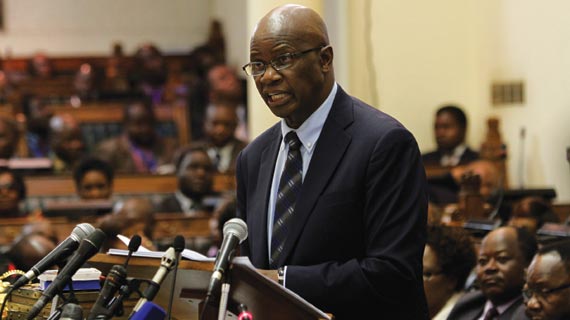
THE 2015 national budget presented by Finance minister Patrick Chinamasa has no prospects of creating jobs for more than 80% of the country’s unemployed population since 81% is set to go towards civil servants’ salaries and pensions, a policy and economic commentator has said.
SILAS NKALA STAFF REPORTER
Chinamasa last month presented a flat $4,118 billion 2015 national budget with $3,32 billion being channelled towards employment costs such as salaries and pensions, leaving only $798 million for operations, debt servicing and capital projects.
Bulawayo-based policy and economic analyst Butler Tambo said if 81% of the budget went towards employment costs, it spelt doom for job creation and the unemployed masses.

“It means that not much employment can be generated or stimulated by the remaining amount, which then paints a bleak future for new jobs being created,” Tambo said.
“Because of the country’s failure to service both domestic and foreign debts, we are unlikely to get any credit lines from international financial institutions any time soon leaving us to continue operating with the liquidity crunch that has bedeviled our economy for the past few years.”
Tambo said he foresaw the government failing to pay civil servants’ salaries before the end of next year considering the massive job losses and company closures reported in the budget.
Chinamasa announced more than 4 610 companies had shut shop between 2011 and 2014 rendering more than 55 400 people jobless.
- Chamisa under fire over US$120K donation
- Mavhunga puts DeMbare into Chibuku quarterfinals
- Pension funds bet on Cabora Bassa oilfields
- Councils defy govt fire tender directive
Keep Reading
“Such job losses paint a grim picture for revenue collection in the form of corporate, PAYE and VAT that the government has lost, further shrinking the tax base when expenditure is actually growing.
“The failure to have money for capital projects also means that there won’t be much in terms of infrastructure development in 2015 and this does not bode well for the country which is riddled with dilapidated infrastructure.”
He gave examples of the National Railways of Zimbabwe, which now only moves less than two million tonnes of cargo despite having a capacity to move as much as 18 million tonnes of cargo per year.
The Zimbabwe Electricity Supply Authority, Tambo said, was another institution failing to fully service consumers.
“Power generation of only 1 237 megawatts (MW) against a peak demand of 2 200MW also makes it difficult for industry to operate. The frequent power outages will become a permanent feature since the government has not invested in a new power plant since the last one commissioned at Hwange Power station in 1987.”
Tambo said industrial capacity utilisation had been on a free fall from 57% in 2011 to 44% in 2012. In 2013, it stood at 39% and is currently at 36%.
“We have already failed as a country to reach our own targets of the gross domestic product growth that we enunciated under ZimAsset. The blueprint had said the economy will grow by 6,1% in 2013, but we only managed 3,1%,” Tambo said.
He said the Zanu PF economic blueprint stated that from 2015 onwards, the economy would be growing at an average of 7,3%, but the above figures have already disputed the ZimAsset assumptions as fictitious.
“Because industry is not performing well as seen by these figures, it then boggles the mind how the economy will grow by 3,2% next year. Industry is poorly performing because of tight liquidity crunch which has made borrowing near impossible as interest rates for loans are prohibitive and short term therefore rendering Zimbabwean-made products uncompetitive in regional markets and also affecting the levels of exports of our country as our products become too expensive.”
He said antiquated equipment in industry makes local goods of inferior quality as compared to the regional products.
Tambo said Zimbabwean companies have never been able to retool since the Unilateral Declaration of Independence days.
“As a result, industry in Zimbabwe operates perpetually on a survival mode making do with obsolete technology and sometimes trying very hard to innovate around that obsolete technology.
“The budget also shows that we are a consumptive economy which does not export much but if we are to grow this economy, we have to export and generate revenue.
“Zimbabwe’s exports totaled $2,4bn against imports of $5,3bn and this has led to a trade deficit of $2, 9 billion for the period to October 2014. We have to save more as a country if we are to succeed and export more in order to create more employment,” the policy analyst said.
He said in the 10 months to October 2014, the country received foreign direct investment (FDI) of $146,6 million compared to $311,3 million during the same period in 2013 and this marked a decline of over 50%.
“Last year, Africa received FDI of over $82 bn with Mozambique getting $8 bn of it, that is 10% of FDI inflows into Africa.
Zimbabwe despite boasting of abundance in natural resources like gold, diamonds, coal, platinum, nickel, copper, iron ore, you name it, has found the going tough in luring investors because of unfriendly policies like the Indigenisation laws, political uncertainty, policy inconsistency and poor rating in the ease of doing business Index and many such other global business indices.”
He said in the past two months of squabbling in Zanu PF, the Zimbabwe Stock Exchange had lost as much as $1 bn.
He said a foreigner in Zimbabwe should know that if they invest $500 000 in a business, they will have to cede 51% of it to local Zimbabwean businesses whereas in Mauritius, anyone who invests the same amount in real estate is automatically given permanent residence status.
“In this regard, it does not take a rocket scientist to determine where investors would rather put their money given a choice between the two countries,” Tambo added.










